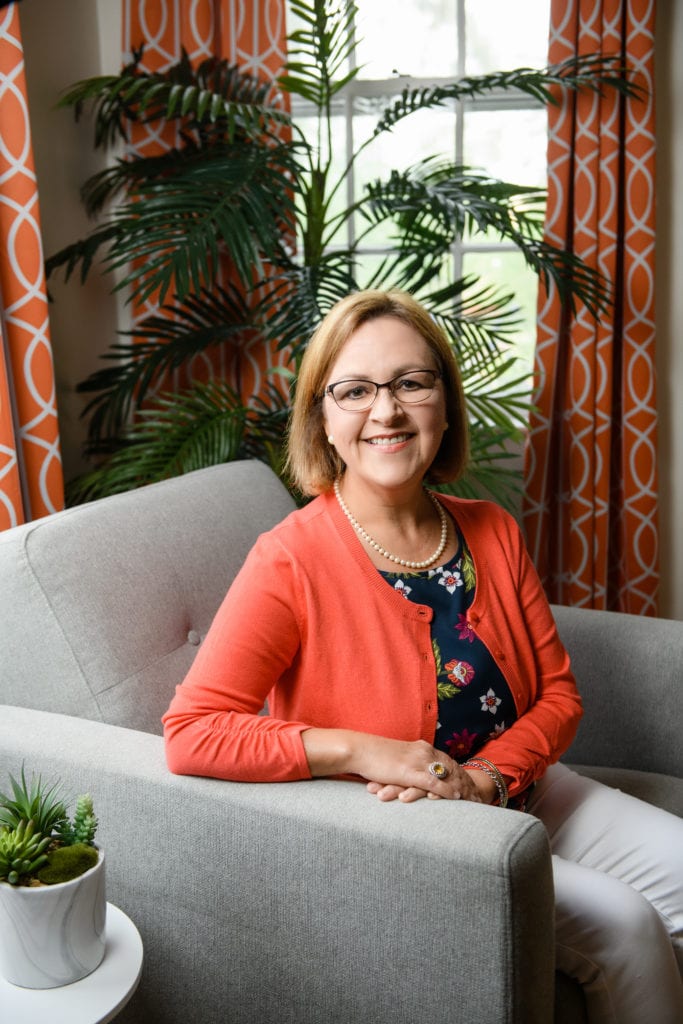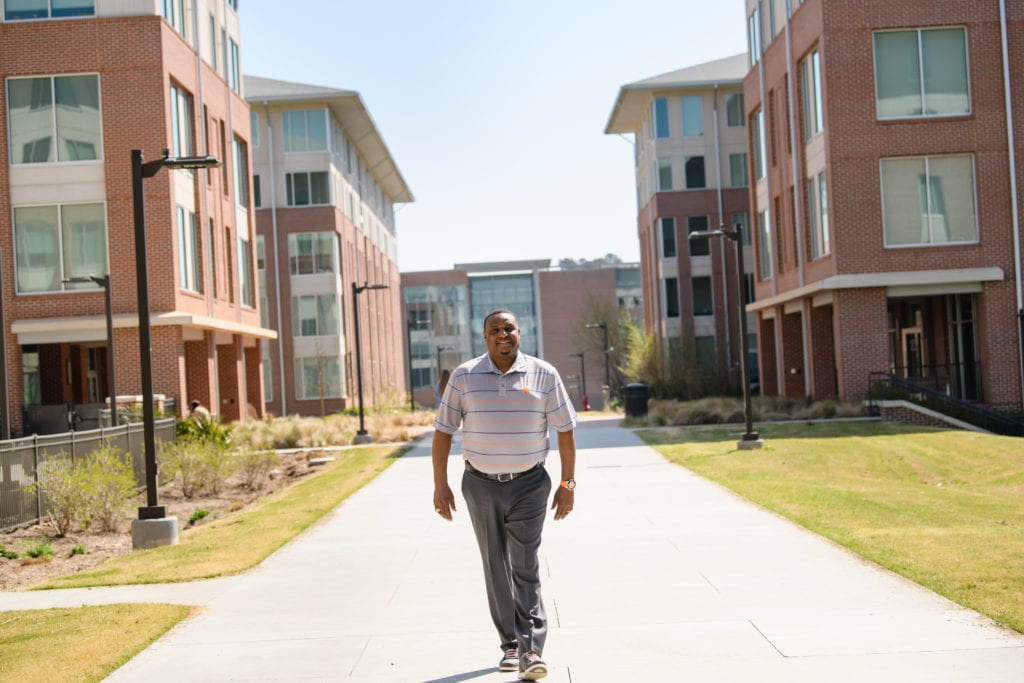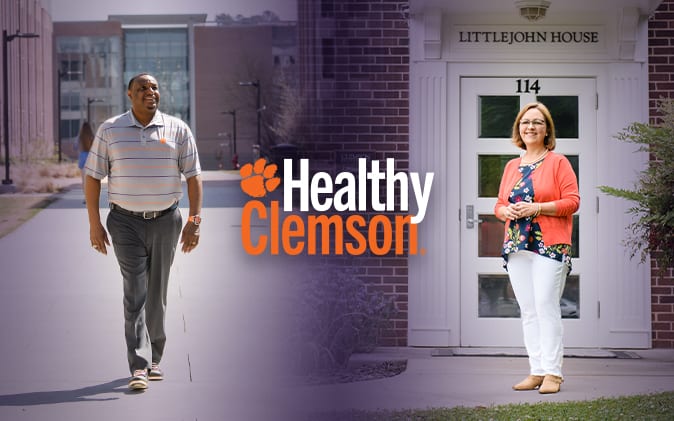In a year of rebuilding, relearning and, in many ways, recovery, two longtime Clemson employees reinvented themselves to care for a campus and maintain a community.
Between longtime staff members Jan Bright and Reggie Hawthorne, there are nearly 50 years of service to Clemson University.
Like so many Clemson employees, these two University veterans have been essential members of their teams and broad contributors to the larger campus community for many years — Bright for nearly two decades and Hawthorne for almost three.
Bright works in the division of University Relations as the assistant to the associate vice president of marketing and brand strategy. She is also the office manager in the Littlejohn House, a bustling creative shop tucked into a historic house on the edge of campus. Hawthorne is director of Custodial & Recycling Services, University Facilities, in the division of Finance and Operations. And the “office” that he oversees is every housing space and academic building on Clemson’s main campus.
During COVID-19, they became among the hundreds of Clemson employees who discovered, in some ways for the first time, what it really means to be essential. And by stepping up during a time of tremendous uncertainty, they steadied our steps and made a difficult journey easier to endure.
A Bright light
“I felt like I was helping someone when they really needed it,” Jan Bright explains on a recent spring day, from a quiet spot on the edge of campus. Now several months removed from when COVID-19 cases were peaking on Clemson’s campus and around the nation, she is back to a more predictable pace of work.

Bright was one of 65 caseworkers deployed by the University throughout the academic year to support students — either when they were notified of a positive COVID-19 test or when they were moved into quarantine because of exposure to the virus. These isolation and quarantining efforts were designed to limit the viral spread and infection rates on and off campus. But the learning curve was steep, explains Suzanne Price, director of residential learning for Clemson Housing & Dining.
Recalling the early days of COVID-19 and the uncertainty it created for students in particular, Price says the typical reaction to a phone call from Student Health Services at that time was, simply, panic. “There were so many students and so many questions,” she recalls.
It became clear that her regular residential life team could not successfully handle quarantine and isolation logistics and provide compassionate care for students. “I quickly realized that we can’t do this alone,” Price says. “That’s when I said, ‘We need to ask for volunteers — and help.’”
So, Price made the ask in late September, both to help absorb the logistical demands the virus created for residential life and to meet the emotional and physical needs of students as they were being moved out of one home and into another, sometimes for an unknown amount of time.
By the second week of the caseworker program, more than 600 students were being helped and supported, Price says. And Bright was among one of the first caseworkers on the ground.
“I knew it was important to have enough workers,” Bright says of her volunteerism.
Once she began connecting with students, she said she felt how appreciative they were of the human connection she provided.
“It helped the University in taking good care of our students and in making sure all their needs were met,” Bright says. “As a parent myself, I’m sure the parents were so grateful to have someone at Clemson calling and talking to their kids personally one-on-one to check on them.”
The effort not only helped students stay connected with the University; Bright says it helped her make connections to Clemson that she’d never made in all her prior years of service.
“It took a lot of volunteers from many different departments to make this work,” she offers. “When things were out of our control, we all upped our game and supported each other to get through it. The University has done a great job of taking care of our students and each other. This, to me, is what it means to be Clemson Family. We all pitch in and are there for each other.”
An essential job
Keeping a national public University safely open and operating during a global pandemic doesn’t happen without a lot of cleaning supplies.
As the person on campus responsible for custodial and recycling operations in every University housing and academic building, Reggie Hawthorne discovered almost overnight that his job wasn’t just essential. It was critical.

“The staff I oversee are responsible for all the custodial and recycling services within our buildings,” Hawthorne says. But one of the initial challenges COVID-19 presented to his team of essential employees was securing the necessary cleaning and safety supplies so that his staff could do their job — and do it safely.
“I had to realize: This isn’t a job you can do on your own,” Hawthorne said recently from a West Campus courtyard, outside several of the housing and academic facilities he oversees. “It’s helped me to see the importance of personal interaction, and it’s helped me appreciate the commitment and dedication of our front-line essential workers to their chosen profession.”
One of the first things that had to be done was creating protocols and procedures for custodians. These essential workers were necessary to allow the University to continue operating, Hawthorne explains, so keeping these men and women safe while they kept campus safe was a top priority.
Securing sanitizing equipment and disinfecting supplies when supply chains were delayed, or frozen, was a daily challenge early on. But even as materials became more available, the demand for their services remained constant.
As the leader of this team of essential workers, Hawthorne — with support from his wife, co-workers and leadership team — knew he had to stay healthy, as well. He instituted a healthier, more holistic lifestyle to help keep his immune system strong and his outlook optimistic.
With much of the critical response now in his rear-view mirror, Hawthorne has his sights set on enhancing recycling, sanitizing and sustainability programs Universitywide, knowing that his staff is well equipped and trained to take those programs to the next level.
“A challenging and interesting part of my job is making sure custodial and recycling operations continue to evolve,” he says. “The way to do that is by taking advantage of new and innovative practices.”
And that means the demands on custodial, recycling and maintenance staff will only grow in the coming months and years.
“I hope that as a result of this pandemic, students and staff are able to gain more respect for the custodian — and that they will see the importance of helping us maintain a clean and safe environment,” Hawthorne says.
“The hope is that everyone will do their part to promote cleanliness in our buildings. Because in the end, it takes everyone to keep our campus community clean, safe and well maintained.”

